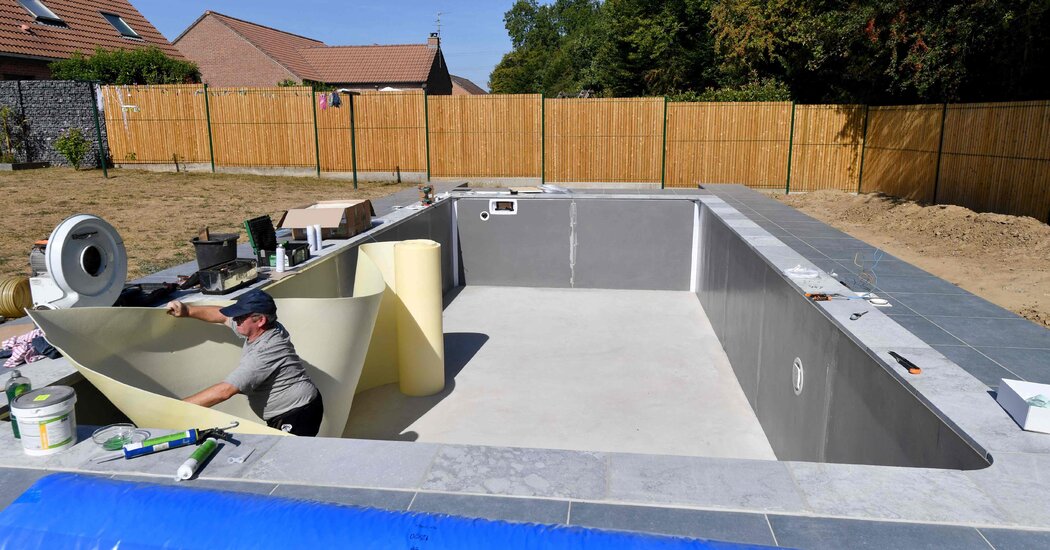French Tax Collectors Use A.I. to Spot Thousands of Undeclared Pools

PARIS — For those trying to offset France’s increasingly sweltering summers by building swimming pools, the tax authorities have a message: If you’re thinking of saving money by keeping your pool hidden from property tax collectors, we’re watching — from above.
Over 20,000 unreported swimming pools have been detected since last October in a handful of French regions by an artificial intelligence tool that scans satellite images of houses and backyards, the authorities announced this week.
The tool enabled the French tax agency to collect nearly 10 million euros, or about $10 million, in property taxes, the authorities said. It will be deployed nationwide in the coming months after being tested over the past year in nine administrative departments, like the Var region on the Mediterranean coast and the Morbihan area of Brittany.
France’s General Directorate of Public Finances said in a statement that “by optimizing the process of detecting undeclared constructions or developments,” the project aims to “fight more effectively against anomalies” and respond to demands for “fairness and fiscal justice.”
In France, permanently constructed pools increase property taxes because they boost a property’s value. Pools are taxed by size and according to local tax rates; the average 30-square-meter pool, or roughly 323 square feet, costs the owner about 200 euros in taxes per year. Property taxes are paid to local municipalities.
A small minority of France’s 67 million citizens own swimming pools, but they have become increasingly popular in recent years. There are over 3 million private swimming pools in France, and over 240,000 were built in 2021 alone, according to France’s Federation of Pool and Spa Professionals, an industry lobbying group.
Antoine Magnant, the deputy director general of public finances, hailed the new software as source of additional revenue for local authorities, which are expected to gain nearly 40 million euros in taxes in 2023 because of it.
Mr. Magnant told Le Parisien, which was first to report on the tool’s results, that the artificial intelligence would be fine-tuned and improved to spot other construction that increase property values and need to be registered with the authorities, like sunrooms.
“We have to be sure that the software can find buildings with large footprints, not the doghouse or the children’s playhouse,” Mr. Magnant said.
The algorithms were developed by the French tax agency in cooperation with Capgemini, a French consulting firm, and uses open-source software by Google. Neither company has access to French tax data, the authorities stressed.
The tool scans publicly available satellite photos, analyzes the surroundings of constructed buildings and identifies pools, which are often impossible to see over walls or hedges but can be detected from above as white or blue rectangles or ovals. The tool then compares those results with an existing database of officially declared pool owners and flags any outliers.
To correct for any mistakes made by the tool, like a stretch of blue tarp accidentally flagged as a pool, human beings verify each finding, the authorities say.
The French tax agency said the algorithm was refined over the course of the testing period through machine learning and that its current margin of error is small. Ninety-four percent of taxpayers who were contacted by the authorities after being flagged by the tool confirmed that they did in fact have a taxable swimming pool.
The 20,356 undeclared pools detected during the test period led the authorities to recover 5.7 million euros in back taxes and 4.1 million euros in taxes for 2022, the authorities said.
But some unions representing public finance employees are wary of the new approach. They dispute the system’s accuracy and worry that the government will cut jobs and replace field work by tax collectors and surveyors, who have long-term knowledge of their communities, with cursory desk duty reviewing the algorithms’ findings.
Philippe Laget, a union official at the General Confederation of Labor branch that represents public finance workers in the Bouches-du-Rhône department, said in an interview that the tool lumped together permanently built pools, which are taxable, with temporary ones that can be dismantled and are not taxable. Face-to-face interaction with taxpayers is key to untangling those situations, he said.
“We are not against technology,” Mr. Laget said. “But in no case should artificial intelligence replace human beings.”
The announcement on pools was not directly tied to the fight against climate change or the energy crunch caused by the war in Ukraine, but it came after weeks of devastating wildfires, severe drought and extreme heat that have strained Europe’s energy supply. These crises have raised questions about whether hallmarks of modern comfort like swimming pools were a necessity in times like this.
Heightened concerns over pollution and energy conservation have already led to growing calls to limit or even ban the use of private jets in France, and some say France should also regulate the use of swimming pools, despite scorching temperatures, as droughts and water restrictions become increasingly common.
Julien Bayou, the national secretary of France’s Green party, told the LCI television broadcaster on Tuesday that “if you want to organize an environmental transition, it has to be fair.”
“You can’t get the population on board if the rich, who by the way are the biggest polluters, get exemptions,” Mr. Bayou said.
France’s national weather forecaster said on Tuesday that the summer of 2022 has been the second-hottest on record. It even prompted some to surreptitiously take dips in other peoples’ pools to escape the heat. Others have angrily slashed private hot tubs over accusations that they waste water, even as farmers are forced to cut back on irrigating their crops.
